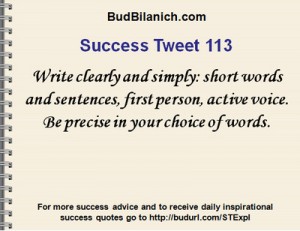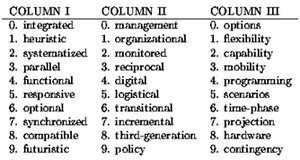 Good writing will set you apart and put you on the road to personal and professional success. Unsuccessful people are poor writers. They are unclear. They ramble. Their emails, letters and reports are a series of long sentences filled with big words that don’t really say anything. You can’t catch people’s attention by writing this way. You need to write in a clear, crisp, concise manner.
Good writing will set you apart and put you on the road to personal and professional success. Unsuccessful people are poor writers. They are unclear. They ramble. Their emails, letters and reports are a series of long sentences filled with big words that don’t really say anything. You can’t catch people’s attention by writing this way. You need to write in a clear, crisp, concise manner.
I try to write like a journalist. I use short sentences with a simple subject-verb-object structure. My writing may read a little staccato-like, but it communicates. People tell me that they can understand my points and the reasoning behind them. And that’s what I want when I write.
Your objective in writing at work is to communicate – not to impress others with your vocabulary. In a recent post I mentioned the time I was speaking with my niece about my book “Straight Talk for Success” at her college graduation party; I said that I’d tried for an “avuncular hip” writing style. She said, “What does that mean?” I replied, “Avuncular means uncle-like. I wanted to sound like a hip uncle to people reading the book.” She came back with a great question: “Why didn’t you just say so?”
She was right. Everybody knows what “uncle-like” means. A lot of people, including magna cum laude graduates like my niece, don’t know the word “avuncular.” I was just showing off my vocabulary by using that word. As a result, I didn’t communicate effectively.
Write with your reader in mind. Sometimes it’s a good idea to read aloud what you’ve written to get a feel for how it will sound to your reader. Write in short, simple sentences. Use the simplest words you can to get across your point, while still being accurate. Write fast. Get your thoughts on paper or the computer screen as quickly as you can. Then edit and rewrite until you’ve said exactly what you want to say. One of my first bosses always told me that rewriting is the secret to good writing.
Spelling counts, too. Correct spelling does two things for you. First, it shows that you have a good command of the language. Second, and more important, correct spelling demonstrates that you respect both yourself and the reader. Misspelled words stand out like sore thumbs to readers.
Don’t just spell check your documents. Proof them. Spellcheck often won’t pick up improper usage in words like “your” and “you’re,” “hear” and “here,” and “their” and “there.”
The same holds true for punctuation. Make sure that you know how to properly use periods, question marks, commas, colons, semicolons, exclamation marks, quotation marks and apostrophes. If you’re not sure about punctuation rules, spend a little time on the Internet learning proper usage.
I like the Poynter Institute for good information about writing. While the information on their site www.poynter.org is aimed at journalists, there is a lot of very helpful information about writing and editing there – especially in the article in “Tip Sheets” which can be found by clicking on the “Reporting, Writing and Editing” button.
This brings me to the Bafflegab Thesaurus. I first saw the Bafflegab Thesaurus back in the 1970s. It’s made a comeback lately, only this time it’s called “Buzzwords for Business Writing.” Whatever you choose to call it, it’s very clever, and it points out just how much jargon has taken over business communication and how few people write clearly and simply.
Here’s how it works. When you’re stuck in your writing, the Business Writing Buzzword Generator helps you create phrases that will make you sound as if you know what you’re talking about, even if – no, especially when – you don’t.
It’s simple. Think of any three-digit number, then select the corresponding buzzword from each column and you’re done.

The creator of the Business Buzzword Generator provides this example…
“The three-digit number 257 produces ‘systematized logistical projection.’ You can drop this phrase into almost any report. It has a ring of decisive, knowledgeable authority. Of course, no one will have the remotest idea of what you’re talking about. But that’s OK. The important thing is, they are not about to admit it.”
Realize that I’m joking here. While “systematized logistical projection” may sound good, it really means nothing. The best writers use small words, simple sentences, and the active voice. Never use this buzzword generator in your business communication. But you can have fun reading the writing of some people who appear to have used it.
The common sense point here is simple. Successful people are dynamic communicators. If you want to become a dynamic communicator, you need to develop your writing skills. Follow the career advice in Success Tweet 113. “Write clearly and simply: short words and sentences, first person, active voice. Be precise in your choice of words.” Writing is not difficult if you write in a manner that communicates well. In general, this means, being clear, concise and easily readable. Use short sentences and the smallest word that communicates exactly what you want to say. Write with your reader in mind. Read your writing aloud before sending it. This will help you get a feel for what your reader will experience.

Speak Your Mind